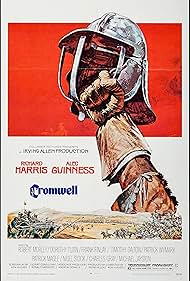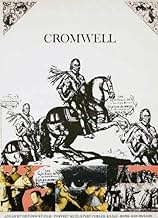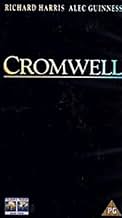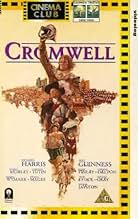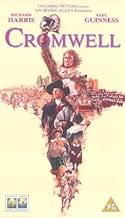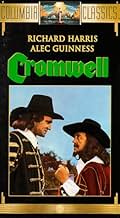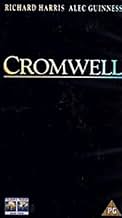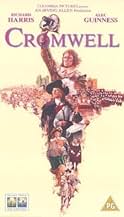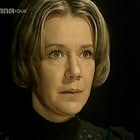Puritan statesman Oliver Cromwell leads England in a civil war against the absolutist and Catholic-sympathetic King Charles I.Puritan statesman Oliver Cromwell leads England in a civil war against the absolutist and Catholic-sympathetic King Charles I.Puritan statesman Oliver Cromwell leads England in a civil war against the absolutist and Catholic-sympathetic King Charles I.
- Won 1 Oscar
- 2 wins & 5 nominations total
- Director
- Writer
- All cast & crew
- Production, box office & more at IMDbPro
Featured reviews
However, putting that to one side, the film version of Cromwell's growing involvement in the War is marginally accurate and well done. Richard Harris, as Cromwell, makes a decent effort although I do feel he makes too much of a theatrical job with the role, with far too much posturing, self-smugness, and above all shouting....
I can understand his unhappiness at the Royalists encroachment of the Common People's liberties; and I can understand him fully remonstrating his feelings in the House of Commons, but Harris seems to shout in nearly every scene. So much so that by the end of the movie he is struggling for breath.
Conversely, Alec Guiness's Charles I is far more intelligently done. Underplayed yet convincing & too some extents we feel more sympathetic to his plight. After all he has a rather scheming Cathloic French Queen, the Catholic Church and a lot of other distractions to occupy his mind and usurp his powers.
The battle scenes are convincing but don't carry the same kind of savagery than the more prosaic Braveheart. But the supporting characters do a good job and add a more rounded feel from Harris' turgid performance.
The directing blows hot & cold, sometimes the story drifts & meanders before pulling back into sharp focus; while the choreography is sweeping & rich in content. The musical score, however, seems tacky & amateurish, lacking any depth in conjunction with what's going on in the film.
However, for all its faults and historical inaccuracies, we do get a slightly better insight into a rather grim & dark chapter in England's turbulent history.
Cromwell is a good film but should be taken with a large pinch of salt as far as retelling history is concerned.
***/*****
Such a career deserves a careful movie. CROMWELL is not that film. It does do well in showing King Charles I (Alec Guinness) as a untrustworthy individual (though one driven to such actions because of his need to maintain his rights as monarch). It does make one serious howler regarding Charles I and his trial for treason. Charles may have been a liar and betrayer at times - but Sir Edward Hyde (who was a leading supporter of his, and would be a statesman in his son's reign and the father-in-law of the future James II) did not testify at Charles's trial as a witness for the prosecution.
Such glaring errors are frequent in the movie (for example, Prince Rupert was not dismissed so callously by his uncle King Charles - Rupert was a very fine cavalry leader, and would remain a fixture in English society when Charles II was restored). The subtle acting of Guinness is not matched by Harris, who rants and raves throughout the film - even in the closing moments talking about his intentions to create better schools and laws. Charles and Cromwell are two fascinating characters, and both deserve a better film than this as the sole film about the English Civil Wars (except for Vincent Price's THE CONQUEROR WORM) to come out.
Spectacular historical melodrama with magnificent acting , wonderful locations , glamorous gowns and attention to period detail . In the movie there are historic events , intense drama, and Richard Harris as well as Alec Guinness give excellent performances , though Harris as a coldly unsympathetic Briton is usually shouting and overacting . Great acting by secondary players : Frank Finlay , Patrick McGee ,Dorothy Tutin, Robert Morley , Geoffrey Keen, Timothy Dalton , Michael Jayston , Douglas Wilmer , Charles Gray , among others . The film is a bit boring for parliament speeches but in the battles (Naseby 1645) is more entertaining , being splendidly staged . The final version of Cromwell at one stage was 180 minutes long, but it was cut down to 141 minutes, deleting a number of featured roles in the process .
The film is appropriately atmospheric and based on real deeds . First-class production design and sets by John Stoll are outstanding , including Oscar winning costume design by Novarese . In fact , close to 5.000 costumes were made , and 17.0000 separate ítems or props found or realized . Heavy make-up was utilized ; in addtion , thousands of wigs from all around the world. Glowing cinematography in Panavision by Geoffrey Unsworth and evocative as well as rousing musical score by Frank Cordell . Good direction by Ken Hughes . The motion picture will appeal to history's buffs . Rating: 7,5/10 , above average .
The Civil War was not a conflict over religion, although it played it's part. It was about "the divine right of kings", against the governance of, by and for the people, i.e. Rex v Parliament. Divided loyalties and opinions were split right across the board.
The capital charges of treason brought against the king was, to my mind, not altogether trumped up, and had some validity. However it was of course a "show trial", and to bring it about the laws had to be changed rapidly. There was no edict at the time that allowed anyone to put a monarch on trial. Issac Dorislaus (a Dutch lawyer) came to the rescue of Parliament. He wrote an order that would enable it to set up the court. This order was based on an old Roman law which stated that a military body (in this case the Parliamentary forces) could legally overthrow a tyrant. Naturally Charles I did not agree, either to this law, or that he was a tyrant. He was still the King, still the Head of State, and as such, above the law. He could do as he wished, and was answerable only to God. For him it was an unfortunate way of looking at things.
The casting of this movie was extremely well thought out, but with one exception. Cromwell himself. I'm not criticising Richard Harris in any way. He played the role superbly, but I'm sure he didn't have an Irish accent. Also he had some extremely noticeable warts on his face which Richard Harris did not. Had the make-up artists gone on vacation? To his credit Richard overcame this miscasting, and acquitted the characterisation of the brusque, complex, and religiously enigmatic Oliver Cromwell with great fervour and passion, and I doubt if anyone else could have done it any better.
On the subject of accents, I wonder whether or not the Scottish accent adopted by Alec Guinness was apt. As Charles I left Scotland at the age of 4, and lived in England until his death, surely he would have cultivated an English one? True he had a Scottish tutor, but I'm still left to wonder. Perhaps someone could set me right.
(Just as a byline, I find it curious that Richard Harris, being an Irishman, accepted the part. In the greater part of Ireland the very name of Oliver Cromwell is loathed and reviled, and for good reason, so it says much for Harris's devotion to the acting profession that he actually did.) Being a musician, I was highly amused at seeing (and hearing) bugles played on horseback during a 17th century battle, reminiscent of the US 7th cavalry. Such instruments weren't developed to such an advanced stage until late into the following century (the 18th).
As another reviewer has noted, Cromwell was certainly not one of the "Five Members" who were to be removed from the House and arrested. These were: John Pym, John Hampden, Denzil Holles, Sir Arthur Haselrig and William Strode. A sixth man, Lord Mandeville (the future Earl of Manchester) was also to be taken.
There are quite a few more historical mistakes and omissions on which other reviewers have remarked, and I don't intend to repeat them. But in defence of the producers it must be said that "The English Civil War" was a momentous stage in British, perhaps even world history, and to illustrate it all in a couple of hours is impossible. Much as Shakespeare, when writing "Henry V", managed on a small stage to capture the flavour of Agincourt and events leading up to it, so this production coped well with a similar task on film. Therefore if certain liberties were taken, and artistic licence used, I think they can, in this case, be excused. Should it have encouraged one student to scuttle towards the history books (or now websites), to learn more about the whole period, then I would say it was a job well done.
Like the many tellings of the story of Mary Tudor and Mary Stuart which have them in climatic meeting, we have Oliver Cromwell and Mary Stuart's grandson, Charles I meeting not once, but several times. They too never met, but the story demands it.
In point of fact Oliver Cromwell was a minor figure in the war between the Crown and Parliament until the Parliamentary Army lost a series of battles and looked like they were going down for the count. It was at that point that Cromwell emerged as a military leader. It turned out that this previously obscure member of Parliament who had no previous military training had a natural genius for warmaking. He turned that army around and eventually Parliament won.
Cromwell could have been George Washington at this point and retired to the farm, but he used his prestige and not as reluctantly as this film shows to make himself the military dictator of Great Britain with the title of Lord Protector.
The experience of Cromwell's reign scarred the English body politic for generations and to a large degree the American one as well. The whole struggle over which interpretation of Christianity would hold sway was something all of the ancestors of the American founding fathers had to deal with. That's when the idea came to them to have no established religion in America. Cromwell's large standing Ironsides Army enforcing his dictatorship led to a positive mania about no standing armies, no quartering of troops and even the right to bear arms. All this because of a collective memory of the Lord Protector.
Richard Harris is a lean and mean Cromwell who keeps saying he just wants to go back to the farm, but somehow winds up grabbing for more power. Alec Guinness is the perfect conception of that luckless monarch Charles I. Please note the relationship between Guinness and Queen Henrietta Marie played by Dorothy Tutin. Two things should be remembered there. First Henrietta Marie is the sister of Louis XIV of France, a monarch with considerable more power than Charles has. Note how Tutin is constantly berating Guinness for not standing up to the Parliament. He does and see where it gets him. Secondly Charles I is one of the very few English monarchs with no royal paramours. He and the Queen were actually in love and he knew her advice was from the heart if it proved disastrous.
Please note a couple of other good performances, Timothy Dalton as Prince Ruppert of the Rhine, Charles's nephew from Germany who actually was a whole lot smarter than he's shown here. And Robert Morley as the Earl of Manchester, one of Cromwell's rivals in the Parliamentary camp.
Oliver Cromwell died in 1558 quite suddenly and within two years the Stuart Monarchy was restored under Charles II, oldest son of Charles I and Henrietta Marie. The collapse of the Protectorate is a subject that English historians have some raging debates over. It was very much like the collapse of the Soviet Union in our time. The collapse of the Protectorate and the Restoration of the Stuarts was filmed in Douglas Fairbanks Jr.'s The Exile and really needs an up to date treatment.
Cromwell as a film is magnificently photographed and directed and actually won an Oscar for costume design. But the flaws in the story line are too many and don't use this film as Cliff's notes kids.
Did you know
- TriviaWhen writer / director Ken Hughes said to Richard Harris that no self-respecting Irishman should ever play Oliver Cromwell, Harris laughed.
- GoofsCromwell was not one of the Members of Parliament named for arrest in the King's warrant. Cromwell was not present in Parliament at the time the King and his troops entered the House of Commons. The scene of he alluding that The King is a traitor actually happened with John Elliott some ten years prior.
- Quotes
King Charles: I do swear that hold this England and its laws dearer to my heart than any here. But gentlemen, if you would reduce me to a figurehead - a puppet king, manipulated by parliament - how then would I serve my country? What manner of king would I be?
Oliver Cromwell: I am persuaded, Your Majesty, that England must move forward to a more enlightened form of government, based upon a true representation of a free people. Such an institution is known as... "democracy", sir.
King Charles: Democracy, Mister...
Oliver Cromwell: Cromwell, sir.
King Charles: Democracy, Mister Cromwell, was a Greek drollery based on the foolish notion that there are extraordinary possibilities in very ordinary people.
Oliver Cromwell: It is the ordinary people, my lord, who would most readily lay down their lives in defense of your realm. It is simply that "being ordinary", they would prefer to be asked - and not told.
- ConnectionsFeatured in The 52nd Annual Academy Awards (1980)
Details
- Release date
- Countries of origin
- Language
- Also known as
- Cromwell - Der Unerbittliche
- Filming locations
- Production companies
- See more company credits at IMDbPro
Box office
- Budget
- £3,750,000 (estimated)
- Runtime2 hours 19 minutes
Contribute to this page

